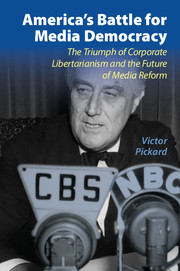 America's Battle for Media Democracy
America's Battle for Media Democracy Book contents
- Frontmatter
- Contents
- Acknowledgments
- Introduction
- 1 The Revolt against Radio
- 2 A Progressive Turn at the FCC
- 3 The Battle of the Blue Book
- 4 The Origins of the Fairness Doctrine
- 5 The 1940s Newspaper Crisis and the Birth of the Hutchins Commission
- 6 Should the Giants Be Slain or Persuaded to Be Good?
- 7 The Postwar Settlement for American Media
- Conclusion
- Bibliography of Primary Sources
- Index
- References
3 - The Battle of the Blue Book
Published online by Cambridge University Press: 05 October 2014
- Frontmatter
- Contents
- Acknowledgments
- Introduction
- 1 The Revolt against Radio
- 2 A Progressive Turn at the FCC
- 3 The Battle of the Blue Book
- 4 The Origins of the Fairness Doctrine
- 5 The 1940s Newspaper Crisis and the Birth of the Hutchins Commission
- 6 Should the Giants Be Slain or Persuaded to Be Good?
- 7 The Postwar Settlement for American Media
- Conclusion
- Bibliography of Primary Sources
- Index
- References
Summary
In March 1946, FCC Commissioner Clifford Durr received a three-page letter from William Tymous, an African American World War II veteran who was outraged by the radio programming greeting him upon his return home:
On the battlefields of France, on Okinawa, on Iwo Jima ... we fought the devils of fascism, discrimination, hate, prejudice, and Jim Crow. We won that fight. We have come home to find that these same enemies are very much alive here.... It is too often the practice of vehicles of American propaganda such as the movie industry and the radio to depict the American Negro as a buffoon, lazy, shiftless, superstitious, ignorant, loose and servile.... This is not the democratic way of life for which so many of our fallen comrades paid so dearly with their lives. This is the Hitler pattern. This is American fascism.
Racist caricatures in radio programs abounded, Tymous observed: “Rochester in the Jack Benny program, Bill and Beulah in Beulah, the maid in Crime Doctor, the maid in The Great Gildersleeve, the maid in the Judy Canova program and the Amos and Andy troupe.” Tymous worried that these sketches were “nailing down in the minds of millions of listeners derogatory and false judgments of fellow-citizens.” He feared that listeners were “conditioned” by these stereotypes to see “nothing wrong in such disguised fostering of race hatred.” He indicted the “sponsors, producers and executives of networks who permit such bigotry and anti-racial pieces on the air.”
Durr responded that he was sympathetic with Tymous’s views, enclosing with his letter a recently issued report that presented “a pretty fair idea of where the commission stands on the over-all responsibility of station licensees for programming” and offered listeners ideas for contesting “the seamier aspects of broadcasting.” The report arrived in a blue cover, its title in bold black lettering: “Public Service Responsibility of Broadcast Licensees.”
- Type
- Chapter
- Information
- America's Battle for Media DemocracyThe Triumph of Corporate Libertarianism and the Future of Media Reform, pp. 62 - 97Publisher: Cambridge University PressPrint publication year: 2014
References
- 1
- Cited by
